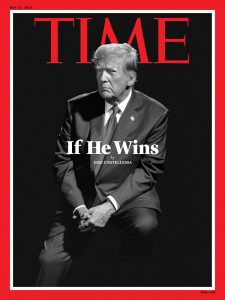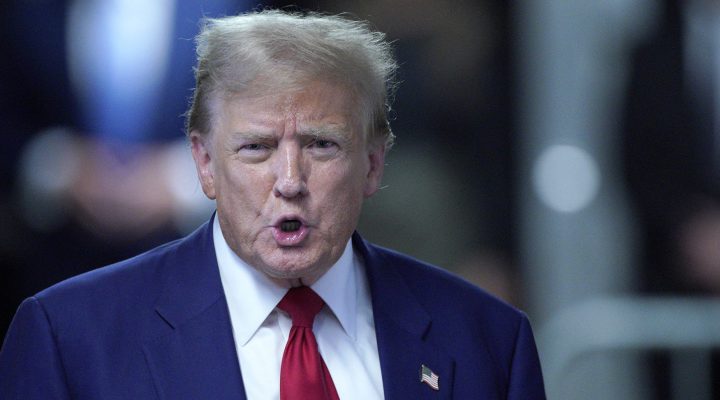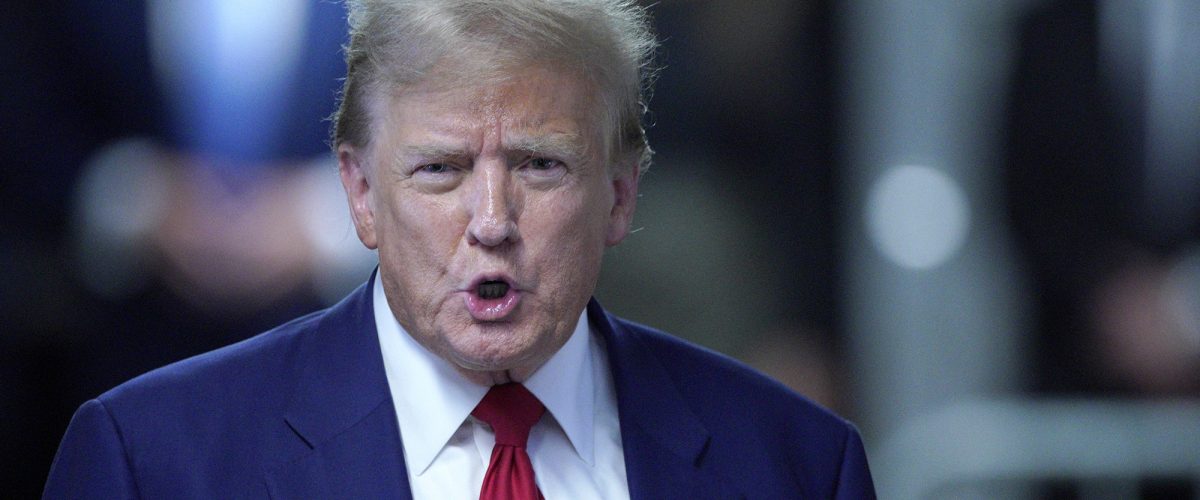A 5,000-word interview with Donald Trump published April 30 in TIME magazine does not mention the words “church,” “religion,” “faith” or “religious liberty” anywhere.
The sweeping article focuses on what Trump plans to do if sent back to the White House in this November’s presidential election. If that agenda has any faith component to it, that is not included in this article.
 Words that do appear frequently in the piece include “immigrants” and “immigration,” “abortion” and “power.”
Words that do appear frequently in the piece include “immigrants” and “immigration,” “abortion” and “power.”
“What emerged in two interviews with Trump, and conversations with more than a dozen of his closest advisers and confidants, were the outlines of an imperial presidency that would reshape America and its role in the world,” writes TIME correspondent Eric Cortellessa.
“To carry out a deportation operation designed to remove more than 11 million people from the country, Trump told me, he would be willing to build migrant detention camps and deploy the U.S. military, both at the border and inland. He would let red states monitor women’s pregnancies and prosecute those who violate abortion bans. He would, at his personal discretion, withhold funds appropriated by Congress, according to top advisers. He would be willing to fire a U.S. attorney who doesn’t carry out his order to prosecute someone, breaking with a tradition of independent law enforcement that dates from America’s founding. He is weighing pardons for every one of his supporters accused of attacking the U.S. Capitol on Jan. 6, 2021, more than 800 of whom have pleaded guilty or been convicted by a jury. He might not come to the aid of an attacked ally in Europe or Asia if he felt that country wasn’t paying enough for its own defense. He would gut the U.S. civil service, deploy the National Guard to American cities as he sees fit, close the White House pandemic-preparedness office, and staff his administration with acolytes who back his false assertion that the 2020 election was stolen.”
The interview drew immediate national attention, and Cortellessa found himself an interviewer being interviewed by other national media outlets.
Cortellessa writes: “Trump would enter a second term backed by a slew of policy shops staffed by loyalists who have drawn up detailed plans in service of his agenda, which would concentrate the powers of the state in the hands of a man whose appetite for power appears all but insatiable.”
“Every election is billed as a national turning point. This time that rings true.”
He adds: “Every election is billed as a national turning point. This time that rings true. To supporters, the prospect of Trump 2.0, unconstrained and backed by a disciplined movement of true believers, offers revolutionary promise. To much of the rest of the nation and the world, it represents an alarming risk. A second Trump term could bring ‘the end of our democracy,’ says presidential historian Douglas Brinkley, ‘and the birth of a new kind of authoritarian presidential order.’”
Trump’s intended actions on immigration are more draconian than those of his four-year presidency.
Not only does he plan to reinstate all the controversial anti-immigrant policies of his presidency, he would orchestrate a massive roundup and deportation of all undocumented people in the country. That could be as many as 11 million people.
TIME explains: “The capstone of this program, advisers say, would be a massive deportation operation that would target millions of people. Trump made similar pledges in his first term, but says he plans to be more aggressive in a second. ‘People need to be deported,’ says Tom Homan, a top Trump adviser and former acting head of Immigration and Customs Enforcement. ‘No one should be off the table.’”
The Center for Migration Studies reports that mass deportations at even part of the scale Trump proposes would have a “major negative effect” the U.S. economy, reducing cumulative GDP by $4.7 trillion over 10 years.
Not only would mass deportations leave millions of essential jobs unfilled, such a plan would harm the housing market and increase the social service burden of legal family members left behind without a breadwinner to support them.
Trump told TIME he would use the National Guard — and possibly other part of the military — to round up and remove undocumented migrants throughout the country. He also would remove federal funding for local police departments that refuse to participate in his demands, he said.
On abortion, Trump more recently has given mixed signals, saying he would not work for a national ban on abortion but thinks states ought to be allowed to set their own laws without federal interference.
Cortellessa writes: “When I ask whether he would be comfortable with states prosecuting women for having abortions beyond the point the laws permit, he says, ‘It’s irrelevant whether I’m comfortable or not. It’s totally irrelevant, because the states are going to make those decisions.’”
“Trump’s allies don’t plan to be passive on abortion if he returns to power.”
Yet TIME notes, “Trump’s allies don’t plan to be passive on abortion if he returns to power. The Heritage Foundation has called for enforcement of a 19th century statute that would outlaw the mailing of abortion pills. The Republican Study Committee, which includes more than 80% of the House GOP conference, included in its 2025 budget proposal the Life at Conception Act, which says the right to life extends to ‘the moment of fertilization.’”
Cortellessa summarizes: “I ask Trump if he would veto that bill if it came to his desk. ‘I don’t have to do anything about vetoes,’ Trump says, ‘because we now have it back in the states.’”
About that previous comment when Trump said during a Fox News town hall with Sean Hannity that if elected to a second term he would only be dictator for a day, Trump told TIME the remark “was said in fun, in jest, sarcastically.”
Cortellessa concludes: “Whether or not he was kidding about bringing a tyrannical end to our 248-year experiment in democracy, I ask him, Don’t you see why many Americans see such talk of dictatorship as contrary to our most cherished principles? Trump says no. Quite the opposite, he insists. ‘I think a lot of people like it.’”
Related articles:
Most Americans believe democracy is at risk in 2024 — but for different reasons
Can you hear him now? | Opinion by Mark Wingfield
Heritage Foundation: Reagan’s favorite think tank reborn for Trump 2.0
Yes, Trump has a ‘radical agenda’ if elected again, but where’s the religious talk? | Analysis by Mark Wingfield


